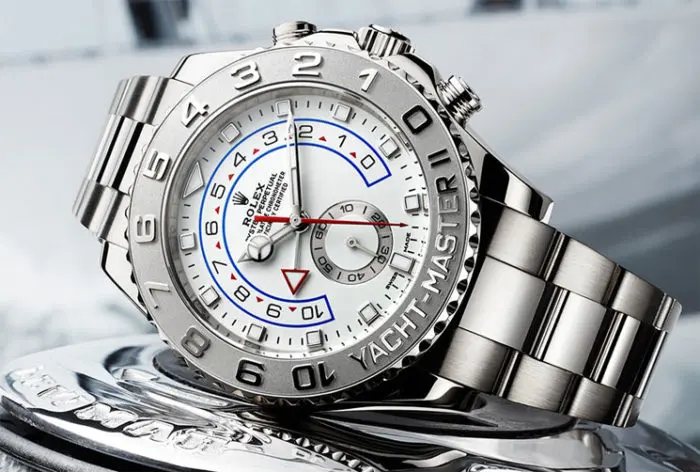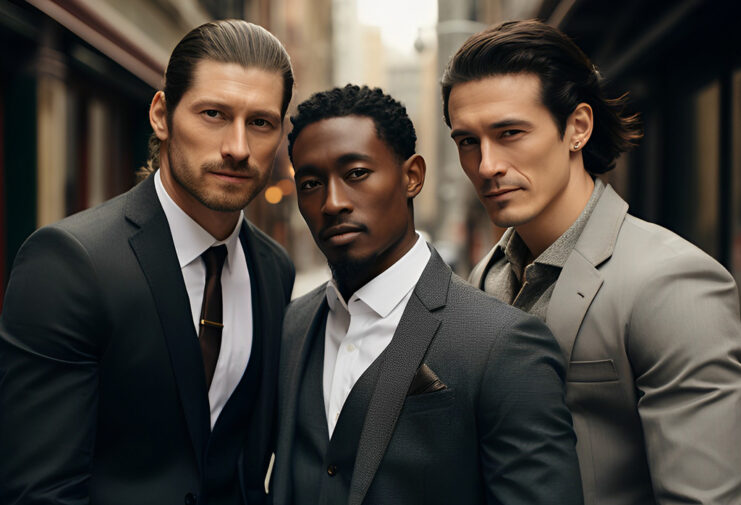This post is an interview transcript. Click here to watch Mignon Fogarty's interview with Antonio Centeno.

Antonio: I requested a meeting to talk about progress and how things were going and I was fired in that meeting which I had called to talk about my progress.
Mignon: I'm Mignon Fogarty from the Open Room Media Podcast where we tell the stories of people taking risks and starting media companies.
Patty: And I'm Patty Bobeck. On this episode of the Open Room Media Podcast, we talk with Marine Corps veteran, Antonio Centeno, who found his niche making videos about a world far from the combat lines — the world of fashion.
Mignon: Antonio founded Real Men Real Style, a website featuring original content aimed to giving tips and tricks for understanding men's style.
Antonio: We're not a clothing company. We're not the information company. We're a company that helps men be the best men that they can be and we do that through the vehicle of clothing and style and image.
Patty: Did I just hear Antonio say that Real Men Real Style is not a media company?
Mignon: Wait for it, Patty. Let's hear Antonio give his elevator pitch for Real Men Real Style.
Antonio: It depends on who I'm speaking with, but normally I'll just simply say you know how most men can't dress well. My thing is I use military history and science to teach guys why style matters and I use video format, written format, infographics to make it simple.
Patty: So Real Men Real Style reaches its audience through articles, e-books, and videos that are all centered on the idea of making men's style easier to understand. And with a yearly revenue of about a half million dollars, it seems like the perfect story of entrepreneurship and success.
Mignon: But this journey into founding Real Men Real Style started with the one word no one ever really wants to hear, the F word — FIRED!

Patty: Actually, this particular story of media entrepreneurship begins years ago all the way in Ukraine. Antonio was working in the country in the mid-2000s where he met the woman who is now his wife.
Mignon: While in Ukraine, Antonio needed to buy a suit. He said he searched and searched in Europe for a suit but found that either they didn’t fit properly or they were of poor quality.
Patty: He did ultimately get a custom suit made in Kiev and also found an online custom clothier based in London, but that search for a quality suit left him wondering.
Antonio: The question that lingered with me was why was it so difficult and why couldn't I find this on the internet, and all of a sudden I realized, well, there isn't an exact company like this based out of United States, so I could go after the US market.
Mignon: Antonio didn’t immediately go after that US custom clothier market. At that time, it was just a thought in the back of his mind.
Patty: He was still working in Ukraine for another company when one particular meeting changed the course of his life.
Antonio: Well, I was working for the company for a few months and I requested a meeting to talk about progress and how things were going and I was fired in that meeting which I have called to talk about my progress. When it comes down to it, looking back, I probably would've fired myself. I came in hired for a job. I was doing another job and I probably wasn't able to deliver as much as I thought I could.
Mignon: Fired within a few months of being hired, Antonio then had to bring his wife and young son over to the United States where he faced a scary situation. How was he going to support his new family?
Patty: To top it off, the year was 2007 and the United States was on the brink of financial collapse. No one was hiring.
Antonio: In 2008, I'm already looking for another job. I think the economy was a bit tougher. Maybe if you had a lot of experience and you were in sales or something, you could find a job pretty easily, but even though I had gone to a good business school, I didn’t have a whole lot of business experience. And so, I also felt that I wasn't — it would've been a really hard — it's just as hard to find a job, I thought, as to start a company, so I'd go ahead and start a company. Everyone I talked to said that it was a much better route.
Mignon: Remember how we told you about the struggle Antonio faced when trying to find a suit in Europe that fit him? Now is where that struggle becomes an opportunity.
Patty: Instead of hitting the streets looking for a job with the millions of other out of work Americans, Antonio decided to take a risk. He would start his own business during the recession.

Mignon: During the recession, Antonio's first business that he founded in the United States was A Tailored Suit, an online men's custom clothier website that made — you guessed it — men's suits.
Patty: In order to drive traffic to his online custom clothier website with the idea of increasing sales, Antonio began creating custom content for the website. He wrote articles teaching men about men's style. Seeing how much traffic the articles were receiving on his website led to another very important transition for Antonio.
Antonio: We were getting about a hundred thousand uniques a month to that little clothier website that didn’t have — I mean, it was an old HTML website and it was only about 50 articles, of which maybe ten were getting the majority of that traffic, and I just thought if I actually dedicated myself to creating more content, I could probably get a lot more traffic.
Mignon: That's when Antonio decided to found Real Men Real Style and create custom content, a lot more content, and get this. He does it all from a small town in Wisconsin. How small? He said they have about a thousand residents.
Antonio: My goal was simply to pay the mortgage and not lose my house. For a long time, I was wondering and wondering, my wife especially was wondering, is this business really going to become a business or is it going to stay a hobby?
Mignon: He bought the domain name, realmenrealstyle.com in 2009 and decided to go full force with Real Men Real Style in 2012. Today, the custom clothier is basically shut down and Antonio focuses all of his time and energy on Real Men Real Style.
Patty: While the business today delivers custom content in a variety of ways, articles, e-books, online courses, Real Men Real Style focused in the beginning on video and capturing a YouTube market. In fact, one of the main catalysts for Antonio getting started in video is pretty funny.
Antonio: I had no skills and in fact, the reason I started — he's a good friend of mine now. My friend, Aaron Marino over at Alpha M Image Consulting, I looked at what he was doing and honestly, it upset me. I was mad. I don’t want to get into the words I was really feeling, but I told my wife this and finally she's like, “Stop complaining. Go out there and beat him. Do it.”
Patty: So he was almost goaded into starting because Aaron's videos made him so frustrated, he just had to make his own. And now, they're friends.
Mignon: I've actually talked to a lot of people who were nervous about not being good enough at something like fiction-writing or podcasting, and then at some point they looked around at what other people were doing and started to think, “Well, I could do that.”
Antonio: But I think the catalyst was seeing somebody else have success and know at least in my mind I can do better.
Mignon: Do it. That's one of Antonio's main mantras for starting a business.
Patty: So Antonio did in fact do it. He founded Real Men Real Style and started creating videos. One of my favorite aspects of Antonio's journey is this. He knew his first video wasn't going to be great, neither was his second or third or fourth. Antonio knew early on he had to fail over and over before getting it right.
Antonio: And I realized it was just a matter of time and practice and I would get better. I focused on the audio and that's a huge thing. So anyone out there on video, if you don’t understand the importance of audio and how that's going to — in many ways, it's more important than video, so we focused on the audio. We practiced and I made a commitment that I was going to knock out at least 50 videos that turned into 100 videos that turned into 200 videos in 200 days, which sounds like a lot, but I can explain how we did that. Really we just kept putting it out there. And once the snowball started to roll, all of a sudden, it just kept getting bigger.

Mignon: Do you hear that, people? This massively successful video entrepreneur didn’t know how to do video when he started. He just went out there and did it and wasn't afraid to fail.
Patty: Today, Real Men Real Style has around 600 public videos completed, and you might be wondering, how did a military vet turned custom clothier turned media entrepreneur become such a trusted and respected style expert?
Antonio: I think if you're relatively smart, you can pick up anything, and I didn’t make crazy claims. I just simply took things a little bit farther and now that I've read hundreds of books and have written thousands of articles, I now have in a sense become the authority.
Mignon: What's Antonio's take then on style versus fashion?
Antonio: I would say fashion is fleeting; style is timeless. Style is more of the — there's a little bit of a science behind it.
Patty: Antonio has some strict business philosophies that he's put into place for Real Men Real Style. The first, he doesn’t follow the hundred-hour workweek that many entrepreneurs believe is gospel when starting your own business.
Mignon: His top priority even as an entrepreneur, family.
Antonio: It's nothing like having a family that forces you to put bookends on your workday. I used to be proud of the hundred-hour workweek. Now, I've realized it's not about how many hours you work, but it's about what you are effectively getting done, so I focus in on not starting my day before 8:00 because I take my kids to school. I eat breakfast with my kids, take my kids to the gym in the morning, and I need to be home by 5:00 to 5:30 because I need to spend time with my family and eat with them, but I've also set up systems so that I can do that.
Mignon: Antonio also believes in creating checklists.
Antonio: You want to reserve your willpower and your strength and your thinking ability for the times that you need it. Doctors use checklists. Jet pilots use checklists. Astronauts use checklists. The reason they use checklists is because you can't afford a mistake.
Mignon: And to avoid the entrepreneurial mood swings that many entrepreneurs can fall victim to, Antonio has a piece of advice that many may not think of when starting your own business.
Antonio: I hired a consultant for a summer and I realized I paid the consultant more per month than I had ever paid myself and I got nothing from that consultant. I realized that wow, I should be giving myself a monthly salary and that way, at least I could budget for it. I know what's coming in. Sure enough, now I've been doing that and that helps prevent a lot of the ups and downs when you know your personal finances were taken care of and you're just paying yourself like you pay all your other employees.

Mignon: Antonio also uses the Eisenhower Matrix.
Patty: The Eisenhower Matrix, for those of you who are not familiar — and to be honest, I wasn't until listening to Antonio talk about it — is based off of a quote from Dwight D. Eisenhower who said —
Mignon: “I have two kinds of problems, the urgent and the important. The urgent are not important, and the important are never urgent.”
Patty: Basically, the Eisenhower Matrix or Eisenhower Method encourages people to address tasks by placing them on a quadrant that shows you what is and isn't urgent, and what is and isn't important.
Mignon: That helps you focus on the things that are important because it can be really easy to get distracted by anything that's urgent even if it isn't important. It's easy to get sucked into always putting out fires.
Patty: Now, those not important tasks can be delegated to someone else or deleted altogether from your to-do list. What you're left with based off of this Eisenhower Matrix is tasks that are the most important to accomplish and will ultimately move your business forward.
Mignon: Identifying the most important and urgent task is such a big problem when you're an entrepreneur because things are constantly coming at you.
Antonio: But what trips up a lot of entrepreneurs is they're focused in on things which are not urgent, not important, or — and this is really tricky — that are urgent but not important.
Patty: So taking all of this advice, eliminating the hundred-hour workweek, establishing systems, making checklists, paying yourself a salary, focusing on tasks that are urgent and important, where does Antonio's business stand today?
Mignon: Antonio's business model for Real Men Real Style focuses on four different revenue streams — affiliate marketing, Google and YouTube ads, information products, and sponsored content. Diversifying your sources of revenue is always important for startups and it was especially important for Antonio.
Patty: The focus on diversifying his sources of revenue has resulted in Real Men Real Style bringing in about half million dollars in revenue a year. That's huge for a small media company out of Wisconsin.
Mignon: That's true. That sounds like a lot, and it is, but he uses it among other things to pay for about a dozen full-time employees.
Patty: And because he has such good training and systems, those people help in ways that mean he can keep the same workweek and spend time with his family.
Mignon: Another surprising thing Antonio's discovered is that the simplest topics often do the best. It's not rocket science and your content doesn't have to be overly complicated or deep. People really do often just want a simple answer. Sometimes, it's so simple it almost seems funny.
Antonio: When I put something out, I'm not trying to hit a homerun. I focus in on hitting those singles, hitting those doubles, and occasionally one of those lines up and we just knock it over the fence.

A video that we put out that went crazy was how to roll your shirt sleeves. Another video that we put out and went crazy on YouTube was how to tuck in your shirt. Now, I have no idea. Well, they're very simple, but we would take something very simple and then we would show you multiple ways to do it that you maybe have never thought of, so it doesn’t have to be overly complex.
Patty: That video, how to roll up shirt sleeves, has to date garnered over 1.8 million views on YouTube.
Antonio: This is actually the roll I choose to go with, and so let's go ahead and get into the second part of this, which is about do you want the roll to be above the elbow or below the elbow.
Patty: So what have we learned from this small town Wisconsin company making a big impact in the world of fashion?
Mignon: If you're disciplined and if you train your people well and have systems, you can produce a lot of quality content and still have a life.
Patty: And because of the internet we all love, you can build a business anywhere even in a tiny little town.
Mignon: So really, follow Antonio's best advice. Just go out there and just do it.
Antonio: But I think that it also is important that if you're going to start a business, you realize there is no better time than now. It's not like you're going to have less children in the future or you're going to be younger in the future, so you might as well start it now.
Mignon: I'm Mignon Fogarty from the Open Room Media Podcast where we tell the stories of people taking risks and starting media companies. We'd like to thank the Reynolds School of Journalism at the University of Nevada in Reno and the Donald W. Reynolds Foundation for supporting this podcast.
Patty: And I'm Patty Bobeck. Our theme music is Happy Alley. Other songs that you heard in this episode were Avant Jazz, Passing Action, Rolling at 5, Legend of One, and Cherry Blossom, all composed by Kevin MacLeod at incompetech.com.
If you enjoyed this episode, subscribe to Open Room Media Podcast on iTunes and never miss a future show. If you have suggestions or comments or ideas for future episodes, please email us at [email protected] and you can find us on Facebook and Twitter at Open Room Media.
Mignon: That's all. Thanks for listening!







